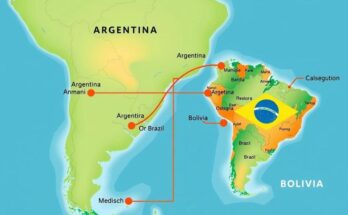Botswana’s new diamond deal with De Beers marks a transformative shift in global resource governance by increasing its share of diamond production significantly. This agreement underscores the importance of strategic negotiations for resource-rich nations, including India, which faces regulatory challenges. The partnership aims to enhance Botswana’s economic growth and serves as a model for resource governance that other countries can emulate.
In recent times, Botswana’s landmark partnership with De Beers, formalized on February 25, 2025, signifies a significant transformation in global resource governance. The agreement expands Botswana’s share of diamond production from 25% to 50% by 2033, enhancing its economic autonomy. This scenario serves as a valuable reference for India, where bureaucratic obstacles hinder effective mineral exploration and sustainable practices.
The ‘Botswana-De Beers Transformational Agreement,’ as noted in a press release by Media OutReach Newswire, represents a paradigm shift, fostering Botswana’s diamond industry while re-establishing market confidence. This partnership aims to elevate economic growth through a development fund focused on diversification and job creation in alignment with Botswana’s Vision 2036.
Botswana’s economy is heavily reliant on diamonds, which constitute approximately 80% of its exports and a quarter of its GDP, according to the International Monetary Fund. Following significant political changes, marked by Duma Boko’s Umbrella for Democratic Change winning the October 2024 elections, this agreement is anticipated to counteract recent economic downturns linked to a declining global diamond market.
The global implications of the Botswana-De Beers collaboration are profound. It establishes a precedent for public-private partnerships in which resource-rich nations can reclaim control over their wealth, advocating for better terms of extraction. In contrast to the historic nature of corporate dominance in developing economies, Botswana’s strategic renegotiation may signal a shift toward equitable profit distribution.
The deal is also indicative of a broader trend among resource-rich nations striving for sustainable economic empowerment rather than merely short-term gains. By gaining control of 50% of its diamonds, Botswana could see shifts in global diamond pricing, affecting market dynamics and challenging the traditional stronghold of established trade hubs.
India, facing regulatory challenges that stifle its mineral wealth, can draw essential lessons from Botswana’s model, prioritizing national interests while ensuring environmental protections. Additionally, parallels can be drawn between Botswana’s circumstances and Ukraine’s mineral wealth, which has recently become a focal point of geopolitical tension, suggesting that control over resources remains a determinant of international relations.
The transformative implications of the Botswana-De Beers agreement highlight an emerging trend towards Resource Nationalism, suggesting that nations may increasingly seek control over their natural assets. This shift could influence the global order, compelling nations to develop robust resource policies to safeguard their economic futures, while they manage the complexities inherent in global markets and diplomacy. Botswana’s strategic maneuvering may indeed inspire other resource-rich countries to follow suit, reshaping both their internal policies and their positions within the global economic framework.
The Botswana-De Beers agreement is a pivotal development in the governance of natural resources, setting a precedent for similar initiatives worldwide. By securing a greater share of diamond production, Botswana seeks to enhance its economic stability and sustainable growth. This scenario offers critical insights for India and other resource-rich nations, emphasizing the need for effective resource management strategies that balance economic interests with environmental sustainability. The implications of this deal extend beyond Botswana, potentially ushering in a new era of resource nationalism, where nations reclaim their wealth and assert their roles in the global market.
Original Source: www.thehansindia.com




